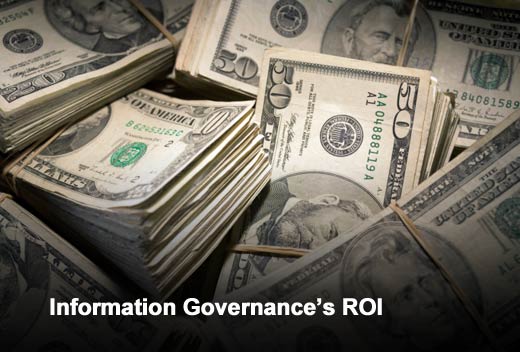Information governance is the set of multi-disciplinary structures, policies, processes and controls implemented to manage information. Gartner states that “the goal of information governance is to ensure compliance with laws and regulations, mitigate risks and protect the confidentiality of sensitive company and customer data.” More than another word for “records management,” information governance aims to support an organization’s regulatory, legal, risk, environmental and operational requirements.
A successful information governance initiative requires a cross-functional team effort, usually consisting of records, IT and legal, often with executive sponsorship. The elevation of records to include IT and legal also brings into play more budgetary options. Information governance will normally be a function of the IT budget rather than records, which opens up many more possibilities.
Many organizations agree that lack of active governance is a big problem, but few have a viable solution. In particular, it can be difficult to get buy-in and obtain funding for a non-revenue-generating initiative. However, information governance is a necessary process for any business that is required to keep both physical and digital records.
Fortunately, according to Michael Shufeldt, global director, digital market leader at Recall, there are reasons so compelling it would be difficult to ignore information governance when the effects are well understood. In this slideshow, he discusses how a proper information governance initiative can deliver a measurable and rapid ROI (return on investment) on key business case factors.
Click through to see how a proper information governance initiative can deliver a measurable and rapid ROI on key business case factors, as identified by Michael Shufeldt, global director, digital market leader at Recall.
Increased value of information
Information governance concerns records and non-records. While traditional records management is a valuable foundation in crafting policies and procedures, information governance includes active enforcement of policy across both digital and physical records and access control of information. A well-executed program will create more visibility of all organizational information. In short, information governance strives to make an organization’s information more valuable.
Cost reduction
While information governance is not revenue-generating, it can be a substantial cost savings center, thus creating the same net effect. The first step in measuring how information governance can help is to discover how much of this data would be affected by proper governance. Studies indicate that anywhere between 40 to 80 percent of corporate data is comprised of ROT (redundant, obsolete, trivial) data. ROT reduction is one of the primary benefits of information governance. Because the average organization spends 25 percent of their IT budget on data storage and 75 percent overall on infrastructure, information governance can have a significant impact on IT spend.
Risk mitigation
Risk reduction is driven by laws and regulations as well as litigation, audit requests and related factors. Just as data growth is increasing, the rate at which new regulations are enacted to deal with this data is increasing, while the ability to enforce and understand these policies is decreasing. Additional laws are passed in the U.S. almost annually to regulate data – this trend is true globally, as well. Organizations must address everything from retention to access controls to privacy of health and financial information within policies and procedures or face potential risk for failing to comply with regulatory requirements.
Data quality and increased efficiencies
Perhaps the biggest and most underrated benefit of strong information governance is increased data quality. Poor data quality costs U.S. businesses $600 billion annually. When the costs of poor quality data in the U.S. government are added in, the price tag increases to $3.1 trillion per year. Some estimates state that poor quality data costs business 20 to 35 percent of their operating revenue! Poor data quality can be caused by many things: ROT, lack of structure, lack of visibility and many other elements. Virtually all of these elements are addressed by a strong information governance initiative.
Increased visibility
A proper information governance program should provide visibility over multiple repositories and the relevance of the data contained in those repositories should increase with enforcement of policies and procedures. This umbrella effect can significantly increase the overall value of organizational data. In addition to giving users the most relevant data possible, business intelligence (BI) tools also benefit from having the best input possible. This affects strategic business decisions at every level of the organization.
Conclusion
By bridging the gap between records, IT and legal, information governance can be properly placed into the IT budget. From there, the factors of cost reduction, decreased risk and great data quality/efficiency provide an extremely compelling argument in favor of a comprehensive information governance project.









